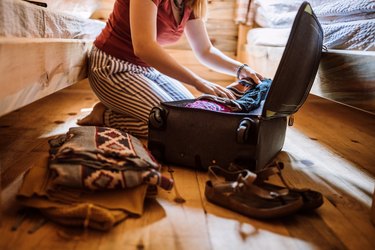
Desperate for a change of scenery? If you're tired of the same four walls, you might be debating whether to rent a house somewhere else to shelter in place for a few weeks or ride out part of the pandemic. And you're not alone.
Longer-term home rentals are particularly attractive to people working remotely who aren't tethered to a particular place. In fact, a 2020 Harris Poll found that 74 percent of American respondents who work from home would consider temporarily relocating for a "workcation."
Video of the Day
Video of the Day
Indeed, Airbnb notes that it's seeing more interest in longer-term stays (that's 28 nights or more) in certain locations that offer access to the great outdoors and a reprieve from crowded urban centers while still within a day's drive to major cities.
Home vacation rentals, where you can minimize contact with other people, may provide safer lodgings compared to hotels with their plethora of public spaces and foot traffic, Jagdish Khubchandani, PhD, a professor of public health at New Mexico State University, tells LIVESTRONG.com.
That said, while renting a private property is a better option, there's still risk involved. Here's what you should do to prepare for a safe stay at your home away from home.
Get tips on how to stay healthy, safe and sane during the novel coronavirus pandemic.
1. Research Your Destination
To avoid spending your holiday hunkered down in a COVID hotspot, research your destination's infection rates before you travel.
"While data on crime, safety and other indicators is easily available by zip code, COVID data for zip code can be hard to find," Khubchandani says. But you can still check state- and county-level stats through the Centers for Disease Control and Prevention's (CDC) COVID Data Tracker. This tracker provides info on each state's cases in the last seven days (per 100,000 people).
The COVID layer in Google Maps is another helpful tool for researching COVID infection rates in an area. Not only can you see the seven-day average of newly reported cases (also per 100,000 people), but maps are color coded to signify whether the cases are trending up or down.
Local newspapers for your destination may be a valuable source of COVID-related information as well, Khubchandani adds.
Still, knowing the numbers in a specific location doesn't make renting an easy decision, Khubchandani says. When choosing a destination, you should still factor in access to essential resources such as health facilities, grocery stores and pharmacies.
Even more important, you should weigh the risk to your health. While the CDC says fully vaccinated domestic travelers are less likely to get or spread COVID-19, if you or someone you're traveling with is unvaccinated and vulnerable to developing a severe illness from COVID-19 (this includes older adults and people with certain underlying medical conditions), it might be safest to put your travel plans on hold.
As a reminder, you're considered fully vaccinated two weeks after your last recommended dose — either the second of two Pfizer or Moderna shots or the one-and-done Johnson & Johnson vaccine.
2. Check Travel Restrictions
Before you hit the road, double-check if your destination has any requirements or restrictions for travelers. In general, fully vaccinated domestic travelers don't need to self-quarantine or test negative before or after a trip, according to the CDC, but some destinations may still have stay-at-home orders in place or require testing or a self-quarantine period upon arrival.
You can find this information by checking current guidelines provided by state and local public health websites, per the CDC.
If you must self-isolate for two weeks, plan ahead by packing enough food, water and medications to last you at least 14 days.
3. Drive When Possible

There's no way around it — travel increases your odds of catching (and spreading) COVID. Indeed, busy places like airports, bus stations and train stations, where you encounter many people in close contact, can make social distancing difficult.
Alternatively, driving to your destination can help you reduce your risk by decreasing your exposure to others.
Still, "making stops along the way for gas, food or bathroom breaks can put you and your traveling companions in close contact with other people and frequently touched surfaces," according to the CDC.
To minimize your number of stops, pack your own food and water for the road. But when you must stop to use the bathroom or pump gas, always wear a mask, socially distance and wash your hands with soap and water for at least 20 seconds after touching any surfaces. Also, use disinfectant wipes or tissues when handling high-touch surfaces like doorknobs, faucets and the gas pump.
4. Clarify Cleaning Protocols
In the age of COVID-19, cleanliness has never been more essential. Prior to booking, inquire about the rental's cleaning practices and procedures. For starters, ask how long it's been since the last occupant (including a cleaning person) vacated the space. Ideally, the house should be vacant for at least one to two days before you move in, Khubchandani says.
Remember, while the novel coronavirus appears to spread primarily through close contact between people and exposure to respiratory droplets when someone sick coughs, sneezes or speaks, the virus may also transmit via airborne particles, per the CDC. This means it can hang suspended in the air for minutes to hours and possibly infect others even after an ill individual vacates an indoor environment.
Consequently, some rental companies have created COVID-19 safety practices for cleaning to protect guests during their visit. For instance, Airbnb's enhanced cleaning program requires a 24-hour vacancy period between bookings and includes a five-step cleaning process, based on guidance from the CDC.
Still, the only way to guarantee your rental home is pristine is to clean the place once you arrive, Khubchandani says. Make sure to sanitize high-touch surfaces such as countertops, light switches, faucets, toilets, doorknobs, drawer pulls and the refrigerator handle with EPA-registered disinfectants.
And, if possible, open windows to ventilate the space. Letting fresh air in will help to carry out and dilute any viral particles still lingering in the air.
5. Communicate Remotely
Reducing face-to-face interactions through contactless communication whenever possible — like remote check-in, for example — can help protect you and the rental owner from potential exposure to COVID-19. Luckily, "everything is electronic these days, so you do not have to meet the landlords or rental place managers," Khubchandani says.
You can usually find this information on the rental property's website. If not, contact the owner or property manager to negotiate contactless check-in and check-out.
Also, discuss the most efficient methods of remote communication — whether texting, calling or email — to use during your stay in case something pops up and you need their assistance.
Tip
While you may feel fine and exhibit no symptoms, there’s a chance that you could have been exposed to COVID-19 during your travels. To protect your family, friends and community, consider self-quarantining — or at least limiting contact with others, especially those who are considered vulnerable — for 14 days after you return.
Concerned About COVID-19?
Read more stories to help you navigate the novel coronavirus pandemic:
- Centers for Disease Control and Prevention: “CDC COVID Data Tracker.”
- Google: “Navigate safely with new COVID data in Google Maps.”
- Airbnb: “Getting started with the 5-step enhanced cleaning process.”
- Centers for Disease Control and Prevention: “How COVID-19 Spreads.”
- Harris Poll: “The Insight: The latest trends from The Harris Poll.”
- Airbnb: “Work From Anywhere: How Airbnb & Guests are Approaching Remote Working.”
- Centers for Disease Control and Prevention: "Do I Need to Take Extra Precautions Against COVID-19"
Is this an emergency? If you are experiencing serious medical symptoms, please see the National Library of Medicine’s list of signs you need emergency medical attention or call 911.